Mircea Eliade’s Research Method in the Field of the History and Philosophy of Religion
Mircea Eliade’s Research Method in the Field of the History and Philosophy of Religion
Author(s): Stelian Manolache
Subject(s): Theology and Religion
Published by: Scientia Moralitas Research Institute
Keywords: homo religious; sacred; profane; Emile Durkheim; Wilhelm Schmidt; Sigmund Freud; Carl Gustav Jung; Georges Dumezil
Summary/Abstract: As a historian and philosopher of religions, a gifted narrator and talented essayist, with a fascinating work of articles, studies and research volumes (Eliade 1991, 93), Mircea Eliade must be discovered and decrypted in a religious key, leaving aside the confusion ethnic – aesthetic. Thus, Eliade affirms his own credo, writing that inside the same ethnical mass, the culture is produced not by the ethnic fibre, it is produced by a bouquet of nuclei developed spiritually, most of the time by religion (Eliade 1990, 40; David 2010, 27) ... the mystic experience – the functional actualisation of the religious reality – being the only effective one (Eliade 1990, 52). In this context, his friend Petre Ţuţea, wrote that Eliade must be thought/ understood inside the existential triangle God-human-nature, a triangle ruled by the category of the archetypal sacred and of the symbol (David 2010, 108), meaning the All-including Real, the unique cause of all things (Țuțea 2013, afterword). His research approach on sacred and profane, also on the religious behaviour, is a complete method of the religious thinking (Țuțea 2013, 15), establishing a dialogue between science and religion for the sake of the Absolute Truth. Occasioned by the celebration of 110 years from the birth of Mircea Eliade, we will discuss in our paper this method included in the dialogue between science and religion, its originality, translated not only with the access to the Significance of the Truth through Revelation (Țuțea 2013, 15), but also with the freedom of thinking and aspiring to the immortality of the soul.
Book: The Future of Ethics, Education and Research
- Page Range: 178-188
- Page Count: 11
- Publication Year: 2017
- Language: English
- Content File-PDF

